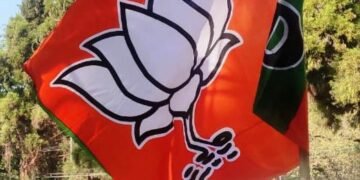Let us count the strategies adopted from time to time by the different Parties and people that have contested the elections. Have they in any way taught us how to go about winning – they certainly seem to, considering the fact that the strategies adopted now are as unique as they are old and as new as they are centred around posters, and faces, and social media, the latter which was nonexistent in the early days and definitely lacking the slogans of the past.
Are they in any allowable sense to be counted also to the credit of the people? Can we say that they are the strategies created by our people, or at least a symptom of the soul of the people in the sense in which we are accustomed to think? Like, is the fact that the ideomania of attaching a religious sentiment to the process of an election by the Congress party a madness of the ancient strategies and in the event that it is true is it evidence of the soul of the party?
Does it mean that the Congress party has more religious leaders and less intellectual statesmen in its fold as compared to other parties, hence its wild assumptions that the BJP is anti Christian although it knows only too well that in Nagaland where 88 per cent of the population is Christian the BJP has 12 sitting MLAs and is likely to raise that number to 25 this time round, because of the BJP’s achievement in raising the standard of living of the people of Nagaland and it is common knowledge that the Nagas are politically more sensible than us, in short we should take a leaf out of their politics – and I mean it.
If what people assume about the Congress, as stated above is true then the Congress should perhaps awaken itself to the reality that it’s falling way behind in the race because its strategies are an exception to the spirit of an election, because those that adopted it in the past learnt that it went counter to the need of the people. In short, is the political strategy of the Congress party really a political strategy at all?
I call to mind the endless policies of divide and rule that was the magic wand of the past in an election, and in which the Congress wielded, and how those strategies diminished and became defunct with the new consciousness of the people that development was more attractive and more permanent, and more reliable and that development was a dynamic process much like politics.
Religion on the other hand is not so. It holds fast to the old dogmas and teachings though its proponents claim that the old teachings can be as relevant now as they were in the past because of their incomparable insight into the destiny of the people and destiny of life on earth. That’s a debatable matter and more of a philosophical problem which is as different from the down to earth problem of development and progress or politics as it is better known.
Those that dealt in the politico-religious divide consequently realised that this mixture of the spiritual and the physical phenomena is too far from the reality and the profundity of political thought and ended up exhausting themselves especially since it’s got nothing to do with who we are as Khasi, Jaintia or Garo.
Yes, there can be no doubt that there is something of ourselves that we have divined and discovered from politics as much as we have from religion and we are thankful for it and at the same time surprised because it has given us a thoughtful piece of who and what we are so that now we have come to discern ourselves and come to realise that our inner self is far richer than anything that can come from without.
We have come to understand that everything we learn from the outer world is of less worth than that which is inherently within us. And so our political parties have forsaken this policy of divide and rule and are focusing on other issues because they have come to realise that hard cash and development is tangible and that is what the people desire and that if they are to win they must initiate something that the people can identify with. That is the change we are seeing, and that explains why the Congress has run out of steam. And so we move onto posters and promises in place of divide and rule.
Let me first deal with the posters that promise money. Slogans at rallies to win the elections are a bygone, debates are a bygone and now promises have come to the fore, promises that someone will pay cash into our bank accounts. I had already written on the inconsistency one sees in the faces and the captions on the posters and I will not go there again. We are not inclined to concede our human logic to that which the posters state knowing full well what we went through and what we will continue to go through if we succumb to the promises on the posters.
On the contrary we have to convince ourselves that what we are seeing on these posters that offer handouts in our accounts makes sense only to the promoters, and the designers who must be earning a whopping fee for every poster they design, and that the larger than life candidates on these posters apparently consider us to be thorough dolts and terribly stupid since they know that we are aware of the reality of the past and the present and know exactly what the future will be like if we concede to and allow these posters to dictate the manner in which we should cast our vote.
Perhaps the only effect that the posters have is that we have now come to recognise the faces of those that dealt us (in Meghalaya) a bad deal for the past five years. Making promises is the long history of the origin of responsibility. When we contemplate these promises we become considerably suspicious and repugnant towards those men who make them and sadly the very same men are in the fray this time as well. It was at this point in time five years back, when the men we see on these posters made promises. Now is the time to revive those memories.
We were promised “Good Governance” where did that go because if what we got was good governance, God save us from a return of their kind of good governance. Now one party promises us Rs.1000 a month in our bank account and another party promises Rs.9000 as a one time down payment into our bank account. Between the two the former seems to have gained greater support. But can we trust the former over the latter? A one time payment can be seen in the here and now though its impact will soon be forgotten by the recipients, and so the Rs.1000 per month seems more attractive. But can we trust the promisor to keep their word because most people are inclined to believe this is just another empty promise?
To inspire trust in the promise of Rs.1000 per month into the account of those who enrolled themselves the promisor, the one who made the promise, should at least have started depositing Rs.1000 into the accounts of those who enrolled from the very first month of their enrolment followed by a regular deposit every month thereafter. This is the trick in the scheme because this would be the best guarantee of the sanctity and the seriousness of the promise and convince those who enrolled.
That being the case, there should be a consequence if one fails to live up to that promise because having given their vote to the promisor, should the promisor fail to pay what he promised he would need to substitute something else that he possessed – a collateral that he had control over for example his possessions, his houses, his compulsory expulsion from the State Legislative Assembly, and the sort.
Above all however the creditor i.e. those who enrolled under the promise of receipt of Rs.1000 per month should be allowed to inflict every kind of indignity, even nullify the electoral process and be permitted to call for a re-election and the withdrawal of their names from the enrolment list and cause the loss of whatever benefit that accrued to the promisor or as much as is considered commensurate with the size of the promise. A promise of this sort – Rs.1000 per month if we form the ruling party – cannot come with such a condition; it must come into force immediately and continue consequent to the person being elected to the State Legislature regardless of whether the person is in the ruling party or the opposition. Isn’t that fair?
Let us be clear as to the logic of this form of agreement – it is strange enough and needs a little looking into, because promises are also made by another party to bring about development, and since I am the spokesperson of that party I must in all fairness do justice to the matter and place strictures on this party as well.
But the mute question arises how do we deal with a party – essentially the members of that party if the pledge of development is broken? How do we determine development? How do we determine a punishment against the party? The community, or in this case the disappointed creditor, will get what repayment it can, one may depend on that. We see it happen all the time…we reject the candidate who cheated on his promises.
The direct harm caused by a party that promises development to the community is a minor matter in comparison to a promise to an individual; though quite apart from this, the promise breaker is a breaker of his contract with the community and so along with the benefits that development would have brought to the community he too is a loser of all the benefits and comforts of communal life of which he has hitherto had and currently still has a share. The wrath of the disappointed voters throws him into more than significant discomfort…it thrusts him away and he becomes a target to every kind of hostility. Punishment at this level results in not only the loss of every right and protection, but all hope of quarter as well, not only for the individual but for the entire party.
And so to the electorate, why should I not voice my suspicion, promises made five years back have been broken and ‘like must always produce like,’ and we should not be surprised to see a repetition of broken promises in the coming years, therefore vote wisely – vote for development and do not concede your vote to one who promises money. We are lagging behind in development whereas it’s upbeat in our neighbouring states, and so in all fairness till there is an accountability attached to promises of money I say vote for development, for the party that has fulfilled its promises, vote for the BJP.
(The writer is the spokesperson of the BJP in Meghalaya)


























